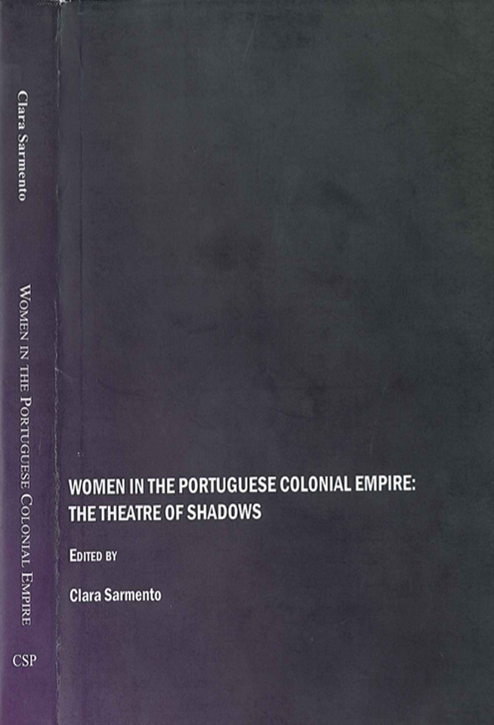
Newcastle-Upon-Tyne: Cambridge Scholars Publishing, 1 October 2010.
Hardcover: 365 pages
Language: English
Coordinator: Clara Sarmento
ISBN-10: 1-4438-2366-X
ISBN-13: 978-1-4438-2366-1
Introduction
Part I: Female Slavery
Chapter One
Memories of Slavery: Women and Human Trade in the Newspapers of Pernambuco, Brazil, from 1850 to 1888
Maria Ângela de Faria Grillo
Chapter Two
Black Slaves and the Practice of Witchcraft in Portugal During the Modern Era
Daniela Buono Calainho
Chapter Three
Female Slavery, Domestic Economy and Social Status in the Zambezi Prazos during the 18th Century
Eugénia Rodrigues
Chapter Four
The Contribution of the Anais de Vila Bela to the Study of Slavery in the Portuguese Empire
Leny Caselli Anzai
Chapter Five
Slave Women’s Children in the Portuguese Empire: Legal Status and its Enforcement
Margarida Seixas
Chapter Six
Women’s Work in the Fairs and Markets of Luanda
Selma Pantoja
Chapter Seven
Food and Religion: Women and the African-Brazilian Identity in the late Nineteenth Century
Zélia Bora
Part II: Literature and Female Voices
Chapter One
Autobiographic Writing and the Adoption of a Female Voice: A Portrait of Mariana Alcoforado’s letters
Betina Ruiz
Chapter Two
Representations of Gender in the Letters and Writings of St. Francis Xavier
Clara Sarmento
Chapter Three
Battle Against Silence: The Diary of Graciete Nogueira Batalha, A Teacher in Macao
Cristina Pinto da Silva
Chapter Four
Female Voices in the Fall of the Empire: O Esplendor de Portugal by António Lobo Antunes
Dalila Silva Lopes
Chapter Five
Ibicaba and the Exploitation of Swiss Immigrants in Brazil
Maria Helena Guimarães
Chapter Six
Settlers and Slavery in Brazil: The Need for a New Approach
Luisa Langford Correia dos Santos
Chapter Seven
Pre-Feminism in the 19th Century: Guiomar Torresão and her Baroness
Monica Rector
Chapter Eight
19th Century Women Travellers: A Female View on the Feminine Condition in Brazil
Teresinha Gema Lins Brandão Chaves
Part III: Cultural Behaviour
Chapter One
The Conquest of Public Space: Female Protagonism in the Religious Sphere (17th and 18th centuries)
Célia Maia Borges
Chapter Two
Equal Before the Law, Unequal in the Community: Education and Social Construction of Female Authority in East Timor
Daniel Schroeter Simião
Chapter Three
The Feminine Ideal of 18th Century Colonial Brazil
Maria de Deus Beites Manso
Chapter Four
Meanders of Female Subordination: When the Servant Becomes the Master
Isabel Pinto
Chapter Five
Gender and Notability: Portuguese Immigrant Women in the Societies of Beneficence in Brazil, 1854-1889
Larissa Patron Chaves
Chapter Six
Women and the Macao Holy House of Mercy
Leonor Seabra
Appendix
Bibliography
Contributors
Index
Women in the Portuguese Colonial Empire: The Theatre of Shadows compiles an extensive collection of essays on the status of women throughout the vast Portuguese colonial space, from Brazil to the Far East, crossing Europe, Africa and India, between the 16th and the 20th century. Absent or mystified, silenced or victimized, women in the History of Portugal and its colonial venture are the living example of the part historiographical discourse, ideology and popular memory have played in the construction of identities, their practices and representations. The production and critical consumption of History have long revealed countless gaps and silences within its own discourse. This book questions the reason for such gaps and silences and wonders about the real role of all those who do not or have never had access to power and to the perpetuating word, those whose voices have been systematically erased from sources and documents because of past or present attending interests.
Women in the Portuguese Colonial Empire: The Theatre of Shadows congregates a wide assortment of disciplines so as to provide multiple independent viewpoints, sources and methodologies. By bringing authors from around the world together, this work ensures that the various cultures and memories that are part of the global saga, as well as the various versions of the history of the Portuguese colonial empire may be heard.
REFERÊNCIAS
Barbara Watson Andaya, Asian Studies Program, University of Hawai’i, USA.
David Inglis, Department of Sociology, School of Social Science, University of Aberdeen, Reino Unido.
ECREA Newsletter, issue 4, June 2009, p. 5.
IIAS Newsletter, nº 48, Summer 2008, p. 46; nº 50, Spring 2009, p. 30.
Philip Rothwell, School of Arts and Sciences, Rutgers, State University of New Jersey.
Portal de la Comunicación InCom-UAB, Institut de la Comunicació, Universidad Autónoma de Barcelona.
New Books on Women, Gender, & Feminism, nos. 58–59, University of Wisconsin, Spring–Fall 2011, pp. 27 e 90.
Websites: IIAS (International Intitute for Asian Studies) Network; Net Humanities and Social Sciences Online; Forum for Medieval and Renaissance Studies in Ireland; Instituto de Investigação Científica Tropical; UNJobs – A Swiss Association; ABES – Agence Bibliographique de L’Enseignement Supérieur.
RECENSÕES CRÍTICAS
Michael Pearson (University of Technology, Sydney).
IIAS (International Institute for Asian Studies) Newsletter, nº 51, Summer 2009, p. 31.
Cathryn Clayton (University of Hawai’i at Manoa), Journal of Global History, vol. 4, issue 03, London School of Economics and Political Science, Nov. 2009, pp. 506-7.
Hilary Owen (University of Manchester), Ellipsis: Journal of the American Portuguese Studies Association, vol. 7, 2009, pp. 173-6.
ACERVO DE BIBLIOTECAS
Segundo o World Catalogue, este livro está disponível em 1172 bibliotecas em todo o mundo (setembro de 2022). LINK
CITAÇÕES